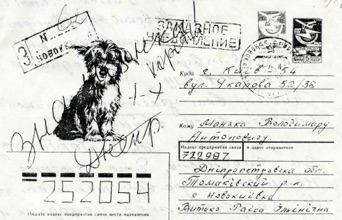












Full Name in Ukrainian: Раїса Іллінічна Витько; Раїса Ільківна Витько; Раїса Чуйко
Full Name in English: Raisa Vytko (née Raisa Chuiko)
Data of Birth: 1924
Place of Birth: Dmytrivka
Raion: Znamenka raion (currently Kropyvnytsky raion)
Oblast: Odesa oblast (currently Kirovohrad oblast)
Country: Ukraine
Copy of original: Yes
Envelope: Yes
Number of pages: 8
Keywords: Ukraine--History--Famine, 1932-1933--Personal narratives; Famines--Ukraine--History--Sources; Famine victims; Holodomor; Голодомор; child; childhood; semiliterate; trauma; family mortality; orphan; orphanage; trauma; burial; political repressions; prosecution; disappearances; WWII; Ostаrbeiter; POW camp; collaborators; act of kindness.
Notes: This letter is written in a mixture of Ukrainian and Russian; the author is semiliterate. Abridged letter is published in 33: holod. Narodna Knyha-Memorial book, Kyiv: Radiansky pysmennyk, 1991, p. 437, under the name “Vytoka Raisa Ilkivna.”


SYNOPSIS

The UCRDC depends on voluntary donations – both individual and institutional - for its financing.
It provides receipts for tax purposes.
-
‣Home
Raisa Vytko (née Chuiko) born in 1924 in the village of Dmytrivka, Znamianka raion, Odesa oblast (currently Dmytrivka, Kropyvnytsky raion, Kirovohrad oblast), describes how she survived the Holodomor as an orphan. She is also a former Ostаrbeiter and a WWII veteran. She sent the letter from the village of Novokyivka, Tokmakivka raion, Dnipropetrovks oblast (currently Novokyivka, Skadovsk raion, Kherson oblast).
It appears from the Raisa’s story that only two people in Chuiko’s family of six survived the Holodomor: Raisa Chuiko, b. 1924, and her younger sister Zoia.
Chuiko’s father, who worked at a sugar refinery in Znamianka, became a victim of repressions. Raisa does not know where her father is buried. Raisa’s mother died, her elder brother Mykola, born 1922, disappeared, and her little brother Ivan, b.1926, died in an orphanage.
After the death of their mother children ended up in an orphanage located somewhere near Znamianka. Raisa only recalls that she witnessed children 4-6 years old and older, thrown daily into a large pit, the same one where her little brother was thrown into when he died.
When the war began, Raisa was looking for work in Kirovohrad (currently Kropyvnytsky) but she was caught by the occupying German forces and taken to Germany as an Ostarbeiter.
In Germany, she was forced to work for a farmer who would beat her up because she was stealing food – milk, bread and potatoes from the farmer’s pigs’ feed to feed the Soviet POWs in the nearby concentration camp. In the concentration camp, POWs were forced to line up each morning, and those who were weak were shot on the spot. The rest were forced to work. Raisa fed the POWs out of compassion and was not afraid to be punished for this. “I was courageous because I knew hunger,” she writes.
She also recalls seeing “our” (Soviet or maybe Ukrainian) troops in German uniforms. They were undergoing military training somewhere near where she was at the time. One of their officers asked Raisa to gather the information about the number of the Soviet POWs executed by the Germans in the POWs camp. She writes that she did but then she lost this information. Her other recollections from the wartime include: finding the owner of the farm where she was forced to work hiding in the barn after he deserted from the German army; escaping the evacuation by the Germans away from the frontline when the Soviet troops were approaching the farm; helping a Soviet reconnaissance team after she escaped and returned to the farm; and seeing how the Germans sent the same unit of the Soviet or Ukrainian soldiers dressed in German uniforms, that she mentioned previously, to attack the Soviet troops and they were yelling “don’t shoot, we are ours (nashi).” She mentions that she had a photo taken at the location of the POW camp, and she can send it.
After the war, Raisa worked for a Soviet military unit, repairing the military uniforms. She boasts about helping to capture “a spy” (when she was still in Germany). It appears that it was an American or a man who arrived from the US to pick up his German wife. The wife allegedly did not want to leave with her husband, and told Raisa about it. Raisa informed the military, and the man was captured. He was interrogated and it was allegedly established that he arrived with the goal of taking photographs and “knew the USSR”.
Raisa apologizes for her semiliterate writing. She finished only grade 7 in school.




